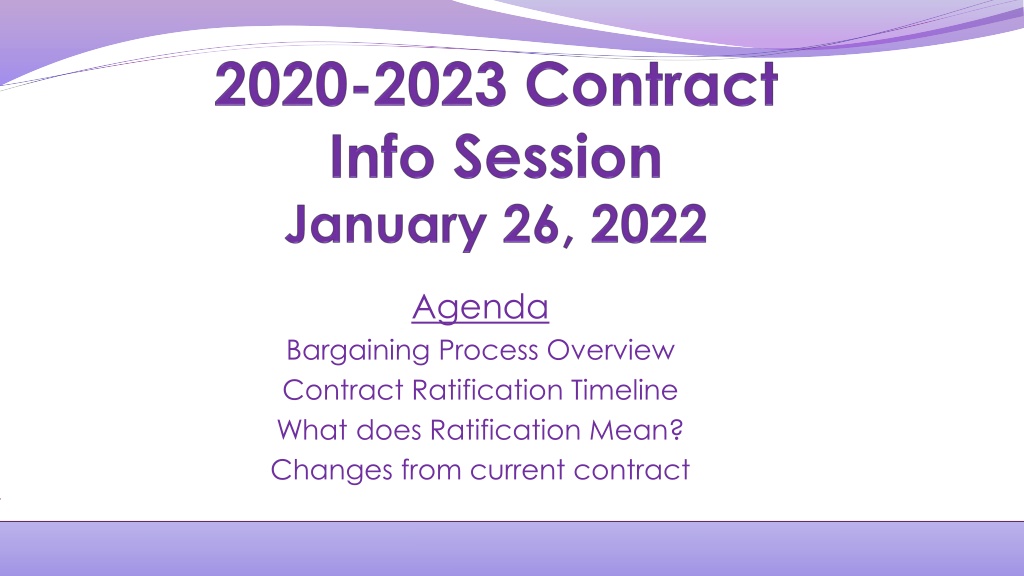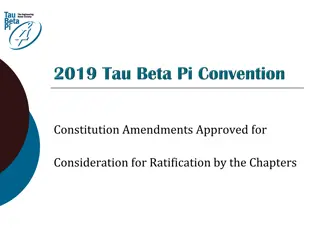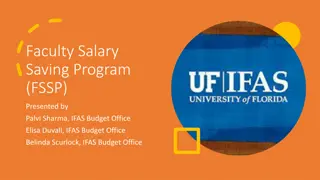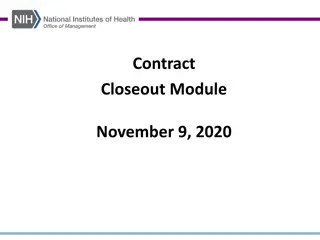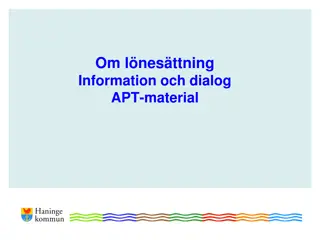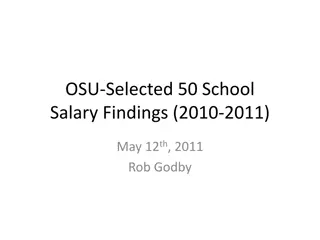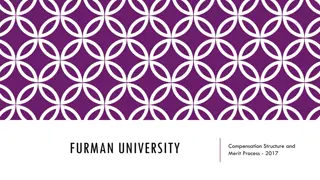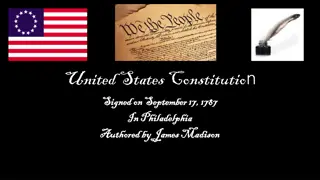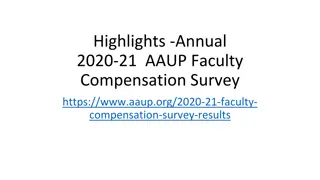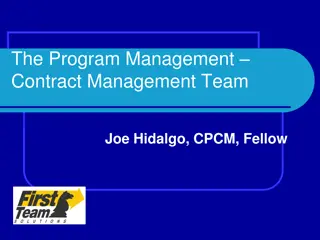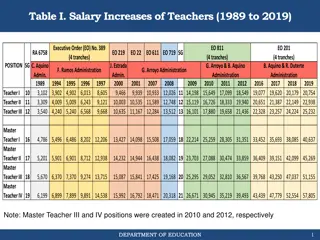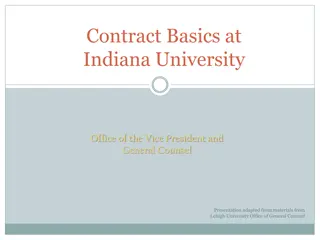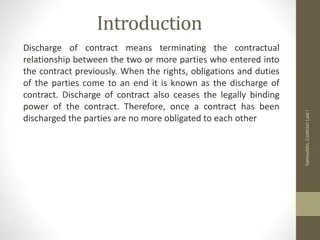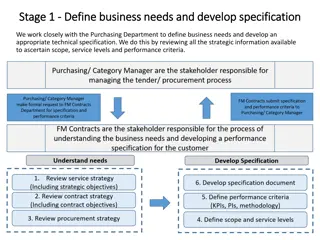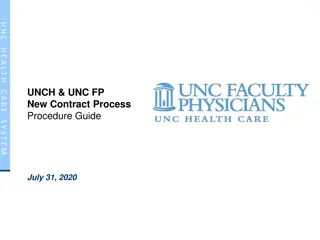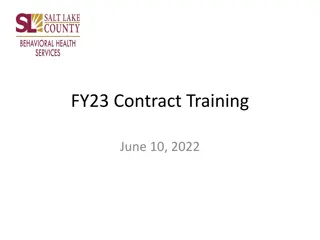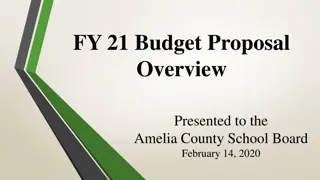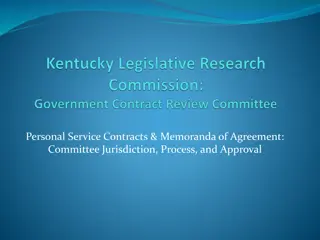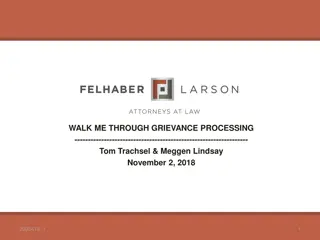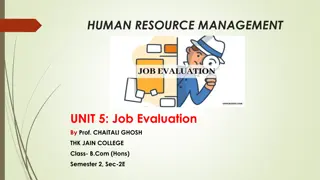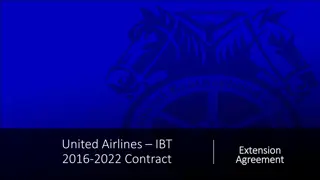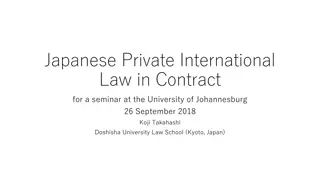Contract Ratification Process and Salary Details Overview
The contract ratification process involves the establishment of a Core Bargaining Team (CBT), drafting proposals, negotiating with the administration, and finally reaching an agreement for ratification by FSU dues-paying members. A yes vote means acceptance of the new contract terms, including salary increases over a three-year period. A no vote would necessitate renegotiation. Specifics of the salary increases, merit pay adjustments, and ratification timeline are detailed in the contract.
Uploaded on Sep 22, 2024 | 0 Views
Download Presentation

Please find below an Image/Link to download the presentation.
The content on the website is provided AS IS for your information and personal use only. It may not be sold, licensed, or shared on other websites without obtaining consent from the author. Download presentation by click this link. If you encounter any issues during the download, it is possible that the publisher has removed the file from their server.
E N D
Presentation Transcript
Agenda Bargaining Process Overview Contract Ratification Timeline What does Ratification Mean? Changes from current contract
Bargaining Process Overview Core Bargaining Team (CBT) Established (October 2019) FSU announces taking applications to serve on the team FSU Executive Committee selects the team. Bargaining Survey (November 2019) CBT drafts survey questions and sends to members. Analysis of responses. CBT Formulates proposal (December to February) Team uses survey responses to develop proposals. Meet with Administration (March 2020) Bargaining sessions begin. Agreement! 11:15PM on December 22, 2021.
Contract Ratification Timeline Agreement becomes Memorandum of Understanding (MOU) Verbal and written agreements are put into a MOU. FSU and Administration review and agree to MOU language.** Members informed Unit members informed of agreement (December 23rd) Email sent with specifics on what was agreed. (January 13th) Member Meeting (January 26th) Review MOU content. Ratification Vote (January 27th to February 2nd) Unit members vote to ratify the contract. The FSU Executive Committee voted unanimously to recommend ratification ** Note: Placing the MOU language into the 150-page contract document will begin soon. This takes time so as to make sure new language has been properly incorporated.
Contract Ratification Who ratifies the contract? FSU dues paying members. What does a yes vote mean? If a majority vote to ratify the contract, this means that the agreed upon language is now adopted and can be implemented. This also means our pay increase funds can be sought from the Commonwealth. In addition, all other contract articles will go into effect if the specific item does not contain an effective date. What dos a no vote mean? If a majority vote not to ratify the contract, then the contract will not be adopted, and the parties will have to return to the table to renegotiate the terms and conditions of your 2020-2023 contract.
Article 26 Salaries What we get (less Associate Lecturers) 2.5% in year one of the contract (effective July 2020); 2% in year two (July 2021); 2% in year three (July 2022); 1.5% bonus in year one to recognize the special efforts faculty put into converting courses to remote modality due to the pandemic. There is no merit pay. You will see that merit pay remains in the contract yet with the note suspended for the 2020 -2023 contract. The contract language 26.1.1 Across the board (ATB) raises Eligibility Bargaining-unit member on payroll as of: June 30, 2020 June 30, 2021 June 30, 2022 Increase takes effect first full pay period of: July 2020 July 2021 July 2022 Across-the-board increase to base salary amount: 1.5% 1.5% 1.5% Increase based on salary in effect on: May 1, 2020 May 1, 2021 May 1, 2022
Article 26 Salaries Article 26.2 Merit Increases Eligibility: Period of Performance Reviewed for Merit AY 2019-2020 AY 2020-2021 AY 2021-2022 Increase takes effect first full pay period of: July 2020 July 2021 July 2022 Campus merit pool amount: 0.5% 0.5% 0.5% Bargaining-unit ember on payroll as of: June 30, 2020 June 30, 2021 June 30, 2022 Payroll snapshot date: May 1, 2020 May 1, 2021 May 1, 2022 Article 26.2.1 Schedule of Merit Increases The merit increase provisions set forth in Article 26.2 shall be suspended during the period July 1, 2020 through June 30, 2023, and will be distributed as part of the base salary increases referenced in 26.1. Article 26.1.4. One Time Additional Payment shall be paid the greater of: 1) one thousand dollars ($1,000); or 2) the equivalent of one and one-half percent (1.5%) of their annual base salary (e.g. not including overtime, additional compensation, or other additions) calculated after the implementation of the raises in 26.1.1(a) and (b).
Article 26 Salaries Article 26.1.5 Salary Adjustment Paid Family and Medical Leave Deductions employees who meet the eligibility requirements of 26.1.1(a) who are on the payroll on June 30, 2020, and on the date this contract is implemented shall receive an additional one-half of one percent (.5%) not compounded Article 26.3 Promotional Increases (based on 100% FTE) take effect September 1st following the academic year in which the successful review takes place Senior Lecturer/Clinical Senior Lecturer $6,500 Senior Lecturer II/Clinical Senior Lecturer II $6,500 Senior Lecturer III/Clinical Senior Lecturer III $6500 Clinical Assistant Professor $7,500 Clinical Associate Professor $8,800 Clinical Professor $14,000 Assistant Professor $8,000 Associate Professor $9,400 Professor $14,700 Librarian II $6,500 Librarian III $8,000 Librarian IV $9,400 Librarian V $10,600
Article 26 Salaries Article 26.4.1 Salary Floors (based on 100% FTE) effective the first pay period of July 2021: $61,000 $70,000 $80,000 $100,000 $53,000 Instructor Assistant Professor Associate Professor Professor Lecturer/Clinical Lecturer $61,000 $65,000 $69,000 Senior Lecturer/Clinical Senior Lecturer Senior Lecturer II/Clinical Senior Lecturer II Senior Lecturer III/Clinical Senior Lecturer III $68,000 $78,000 $98,000 $54,000 Clinical Assistant Professor Clinical Associate Professor Clinical Professor Librarian I $60,500 $68,500 $78,000 $88,500 Librarian II Librarian III Librarian IV Librarian V Article 26.4.2 Associate Lecturers Beginning in Spring 2022, non-tenure track faculty at the rank of Associate Lecturer or Clinical Associate Lecturer will be paid a minimum per-course rate of $5350.
Article 36. Continuing Education Summer and Winter course payment is contained in Article 36. Article 36.4 Salaries 2017 2020 Contract Fixed course rate 2020 2023 Contract Fixed course rate Assoc Lecturer: $4500 Lecturer or above: $5100 Regardless of rank: $5100
Article 26 RES & Travel Funds Year One $150,000 Year Two $150,000 Year Three $150,000 RES Funds Anti-Racism $50,000 $25,000 $25,000 Travel Funds $275,000 $325,000 $325,000 26.6.1.a RES Funds Codifies that any remaining funds go to the Healey Library budget. 26.6.1.b Travel Funds Awards increased from $1000 to $1150. Librarians and Clinical Faculty now able to access funds. 26.9.1.a Anomaly Added Scholarship of Practice faculty (all ranks) to eligibility
Article 15 Research Intensive Semester Research Intensive Semester Finally, able to get this in the contract! Upon hire, all new non-tenured, tenure-stream faculty will be awarded two discretionary course load reductions (CLR s). At their option, they may either take these one at a time or bundle the discretionary CLR s together to create a single Research-Intensive Semester during which they will have no teaching assignments. Pre-tenured faculty on a Research-Intensive Semester will still be expected to perform their normal service obligations. The department chair will take both the pre-tenured faculty member s preference and departmental needs into account in approving the timing of a pre-tenured faculty member s deployment of CLR s awarded upon hire, including the timing of a Research -Intensive Semester.
Article 15: Faculty Workload Article 15.7 Tenure stream faculty teaching loads New language that codifies the teaching load is 2-2 for research active faculty. In keeping with the University-wide guidelines on faculty workload (BOT Doc. T 74-111), tenure-stream faculty at UMass Boston have a normal teaching load of six three-credit courses per year, typically arranged as three courses per semester (3-3). For research-active faculty, where research-active is defined as meeting departmental and college expectations for contributions within the area of Research, Creative, and Professional Activity, as referenced in Article 12 ( Faculty Personnel Standards and Procedures ), paragraph 1, that typical teaching assignment is modified to four courses per year, typically arranged as two courses per semester (2-2). Article 15.7.1 Probationary pre-tenure faculty Pre-tenure faculty on the tenure-track are deemed research-active and will be scheduled for a 2-2 course load throughout their probationary period.
Article 15: Retaining 2-2 Bargaining is about trade-offs. To codify the 2-2 required a trade-off Article 15.8 The criteria by which tenured faculty qualify to maintain research-active status in a particular department or other academic unit will be determined, subject to the approval of the dean, by the Department (or unit) Personnel Committee, posted, and communicated to all faculty in the department/unit. Article 15.9 Tenured faculty will be evaluated by each Department/unit Personnel Committee (DPC), department chair, and dean on an annual basis as part of the regular Annual Faculty Report process, to determine if they have met the criteria for research-active status in the year being evaluated. The designations to be used for the AFR reviews shall be: Meets or Does Not Meet Expectations for research-active status. Any tenured faculty members who receive a final designation of Does Not Meet Expectations in research/scholarship through a given AFR process will maintain their designation as research-active and remain at a 2-2 teaching load for two (2) additional years, to allow them opportunity to improve their designation. A tenured faculty member who receives an AFR designation of Does Not Meet Expectations for three years in a row will revert to a 3-3 teaching load as of the spring semester immediately following the third AFR review. A tenured faculty member who has converted to a 3-3 teaching load shall stay at that load unless or until the DPC, ratified by the department chair and dean, finds them again to Meet Expectations as part of the regular Annual Faculty Report process for research-active status. A tenured faculty member who moves from a designation of Does Not Meet Expectations to Meets Expectations will revert to a 2-2 teaching load as of the spring semester immediately following the AFR review.
Article 15 Faculty Workload Enrollment caps increase The FSU fought hard on this item. Admin proposal began with up to a 25% increase. We were able to include only for multi sections classes and only for two weeks allowed to increase. Article 15.4 New language Once course capacities are announced for a given semester schedule, individual course capacities may be increased: a) At the discretion of the instructor of the course; b) Upon request to the instructor by the department chair (or dean in units where there are no department chairs), at the discretion of the instructor; c) In cases where the chair/dean seeks to raise the capacity of all sections of a multi(5+)- sectioned course, the chair/dean may increase the capacity of the course by no more than 5% of the original cap, rounded upward to the nearest whole number, with a minimum of one, in order to accommodate a surge in enrollment for the relevant semester occurring between the week before classes start and the end of the Add/Drop Period. Any such increase in course capacity will apply only to the relevant semester.
Article 21 Non-Tenure-Track Faculty Article 21.2.3.c Senior Lecturer III Creates a new rank. A full-time-equivalent instructional load of 3-3, with a further increased service load. Article 21.2.3.b Senior Lecturer II Adjusts workload from 4-4. Full-time-equivalent instructional load of 4-3 or 3-4, with an increased service load. Article 21.2.2.c and d Opt-in if wish to remain at a 4-4 teaching load for above ranks.
Article 21 Non-Tenure-Track Faculty Article 21.10.2.c Progression in Ranks Senior Lecturers II/Clinical Senior Lecturers II who have completed six years of full-time- equivalent service in that title are eligible for promotion to Senior Lecturer III/Clinical Senior Lecturer III. This is consistent with the requirement to for SLI and SLII. Article 21.12.1.c Eligibility for Promotion All Senior Lecturers II/Clinical Senior Lecturers II with at least six years of full -time-equivalent service as a Senior Lecturer II/Clinical Senior Lecturer II, or in a position, excluding student employment, with the duties and responsibilities substantially the same as Senior Lecturers II/Clinical Senior Lecturers II, will be eligible for promotion to Senior Lecturer III/Clinical Senior Lecturer III. This is consistent with the requirements for SLI and SLII.
Article 21 Non-Tenure-Track Faculty Article 21.7 NTT Faculty Access to Resources Added language to allow for space for student meetings. space for confidential student meetings .. Article 21.14.4.c(i) Suspension and Dismissal for Disciplinary Reasons Added that any NTT member subject to the 21.14 dismissal process will be given a minimum of 3 weeks following receipt of notification of the formal charges per 21.14.4.b to prepare for the dismissal hearing. The current language does not specify a time frame. Is consistent with TT dismissal policy
Memorandum of Understandings Assign teaching credit for master s thesis and doctoral dissertation advising: The parties agree that the Provost will convene a committee for the purpose of researching whether and how UMass Boston departments and colleges provide teaching credit to faculty who advise students pursuing master's theses and doctoral dissertations and/or teach independent studies. By December 1, 2022, the committee will propose for the provost s consideration the establishment of a baseline standard of whether and how teaching credit for these activities will be assigned, to apply across colleges and departments. The proposal will be submitted to the provost, the Faculty Council, Deans, and the Faculty Staff Union. The Provost will respond in writing by January 31, 2023. NTTs participating in department governance The parties agree that the Provost will convene a committee for the purpose of researching how UMass Boston departments can better integrate non-tenure track faculty into department life. The committee will focus on ways in which Lecturers on continuing appointment (all ranks) can best participate in departmental governance. For instance, key questions may include under what circumstances, to what extent, and on what types of issues should lecturers on continuing appointment have voting rights within their respective departments.
